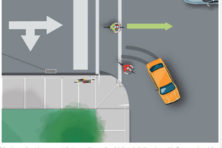Ephraim Not Likely to Get Wet
- Share
- Tweet
- Pin
- Share
The last dry community in the state of Wisconsin is not likely to get wet any time soon. The village of Ephraim has had a long-standing ordinance against the sale of alcoholic beverages, which may the largest reason for its unique image throughout the county and the state.
A minor uproar was sparked recently when reports hinted that a change in status might be imminent for the village. Village President Paul Burton said these reports and rumors may have been exaggerated and given undue significance.
There’s never going to be a bar in Ephraim,” Burton said, “at least not in my lifetime.”
Burton said the idea of changing the rule was brought up by board members concerned that “Ephraim’s economy may not be as vital as it once was. We know that restaurants don’t want to establish here without the ability to serve beer and wine. So it’s something we have agreed to look at.”
The prospect has generated an emotional response,” Burton said. Thought that response has been largely negative, and thought he does not foresee the village doling out liquor licenses any time soon, he leaves open the slight possibility that alcohol may someday be sold in some form, such as beer and wine at restaurants or retail stores.
We have to keep an open mind,” he said, “especially in trying to look at the village economy down the road.”
This sentiment is shared by Gary Sheuerman, who has owned the Summer Kitchen for the past 15 years. “I don’t need it for my business,” Sheuerman said, “but it should be an option.”
Noting that Ephraim businesses are contending with businesses in communities that do offer alcoholic beverages, he feels that allowing beer and wine would help Ephraim businesses compete.
Sheuerman said that the village may have to get beyond the sentiment that “it’s always been that way, and look at what’s best for the village.”
Burton said a referendum that would have allowed alcoholic beverages to be sold within the village was defeated by a three to one margin 10 years ago.

